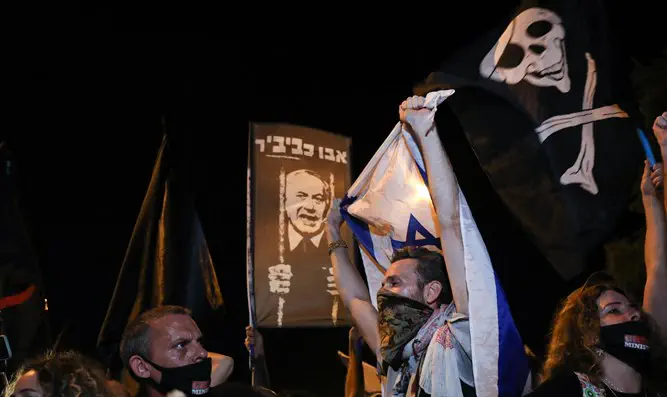Civilized democratic forms of direct and indirect democracy differ from mob democracy whose whiff arises from the streets of Jerusalem.
By Dr. Mordechai Nisan , INN

The periodic anti-Netanyahu summer street protests in Jerusalem and Tel Aviv mix enthusiasm with nihilism. There is much noise, indignation, boisterous energy, youthful spirit, dancing, and colorful and creative placards.
An air of moral purity hovers above and among the participants. The Prime Minister is defamed as motivated solely by personal self-interest and corruption, while the demonstrators assume the pose of an altruistic band of high-minded citizens.
Flags and Frustration
Incoherent messages emanate from Paris Square corner Balfour Street in Jerusalem, facing the Prime Minister’s residence. A leftist coalition demands through words and symbols a better life and a future with hope, the end to the “occupation” and against annexation, for the liberation of “Palestine”, justice for Arabs, gay rights, and Netanyahu’s ouster. The red flags and the black flags adorning the protest convey Marxist and anarchist themes mobilized for the inchoate crowd of demonstrators.
This is not the political stuff of revolution but an expression of frustration and revulsion from the political class in power. A few thousand demonstrators are not, as of now, able to launch a shift in Israeli social and political life.
The speech codes of the protesters, like the foremost mantra of “Crime Minister,” expose the enslaved minds of the demonstrators. The political remains of the historic left-right ideological and cultural chasm in Israel are like archeological artifacts in the public psyche, and provide the platform for visceral malice toward Prime Minister Netanyahu. That Netanyahu cannot solve the corona virus epidemic that he obviously did not create is evidence, the protesters infer, of his alleged callous character.
Types of Democracy
The demonstrators clamor for democracy, liberty, and justice. They say “no to dictatorship” and call for “ending police violence.” One sign mentioned “1933” to warn of Israel’s drift into a Nazi mold.
Beside their whining and frivolity in the streets, their demands are glaringly out of touch with reality. Some protesters came to complain about unemployment and poverty, but their voices are marginal in the festivities. Undoubtedly, boredom has been a major catalyst getting people out on to the streets.
The Netanyahu-led coalition government, and specifically Likud’s primacy, emerged in free general elections (the third in succession). Netanyahu did not seize power, rather he came to power by the votes of Israeli citizens. This is Israeli democracy in action, while the so-called leftist devotees of democracy have turned against it in a frenzy to subvert the majority popular choice.
Israel is a typical parliamentary democracy governed by elected representatives of the people. This “indirect democracy” is normative in the democratic countries of modern times. It is different from “direct democracy” as existed in the Athenian polis and early American townships. Both these civilized democratic forms, of direct and indirect democracy, differ from “mob democracy” whose whiff arises in the last weeks from the streets of Jerusalem and Tel Aviv. If riots and disorder will overthrow a legitimate government, then Israel will collapse in a sea of chaos.
The protesters have an (unstifled) opinion that they want to impose by force – not violence – on the Israeli people. They avoid discussing their opinion and prefer to dictate it. Their mode of operation is more in the spirit of a popular insurgency or mini-rebellion, in the name of justice and not legality; this while running a campaign – whose guiding hidden hand has yet to surface – to impose their will against Netanyahu and Likud, and the Israeli people.
The Right to Assemble Peaceably
The lawless strain in the protests, in confronting the police and violating the demonstration provisions, blocking streets and disrupting traffic, is not a result of suffering from an oppressive regime, but a mimicking of American urban scenes and buoyed by incoherent anti-Likud rage decades-old. This is a negative campaign, riding on a mindless myth of street subversion, to inspire fear, and ignore the judicial process soon to put Netanyahu on trial. A dosage of iconoclasm combined with infantilism fills the public arena, in the absence of any program of action or concrete reform proposals. Fortunately, a responsible government in Jerusalem conducts national affairs.
On all political issues, there is inevitably a built-in conflict of interests. The residents of Rehavia and those proximate to Balfour and Paris Square have a right to quiet evenings and nights this summer in Jerusalem. They want to be able to go to sleep without harassment by an incessant cacophony of drumming, trumpeting, and yelling in the streets.
The temper of the protests certainly does not conform to the Third Article in the American Bill of Rights that recognizes “the right of the people peaceably to assemble.” Acknowledging and respecting the rights of people in their homes and on the roads, who neither hate Netanyahu nor brandish colorful bandannas, would make an important contribution to civil peace and social solidarity.
Dr. Mordechai Nisan is a retired lecturer in Middle East Studies at the Hebrew University of Jerusalem.Among his books is The Conscience of Lebanon: A Political Biography of Etienne Sakr (Abu-Arz) and Only Israel West of the River: The Jewish State and the Palestinian Question, available at Amazon.com.His most recent book is The Crack-Up of the Israeli Left (Canada: Mantua Books, 2019).



Leave a Reply
You must be logged in to post a comment.